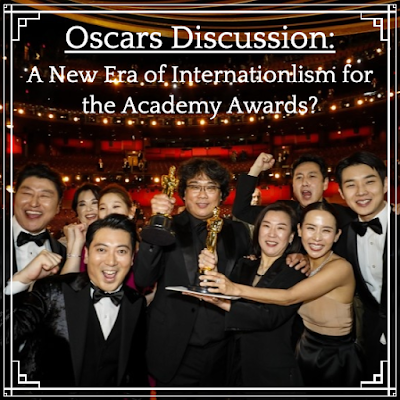Parasite: Ushering In A New Era For The Oscars?
Last night's Best Picture win by Parasite was a major milestone for the Academy Awards. It marked the first time in history that a foreign-language film won the Oscars' highest accolade. As many voices are currently discussing, this may be the precursor to a new era of internationalism for the Academy Awards, as well as, for Hollywood and Western cinema.
Firstly, let's just say with certainty that Bong Joon-Ho's Parasite deserved the myriad of awards it received last night: Best International Feature, Original Screenplay, Best Director and Best Picture. Notably, making the wins even more special was the fact that it was the first time a South Korean had been nominated for either Best Picture or International Feature. Parasite really is a marvelous film though, and one that should be seen by all. The film is about a 'parasitic' lower-class family who slowly infiltrate an upper-class family through various ingenious means in order to thrive off of their wealth and position. Remarkably, it is both an excellent thriller with hard-cutting twists and also a great satire and commentary of persisting issues of class within South Korea. While Bong has been making a name for himself for a number of years with great films across varying genres - Snowpiercer, The Host, Okja and Mother - Parasite cements him as a filmmaker in today's top echelon.
Now, for those familiar with past winners, the distinction of first 'foreign-language' Best Picture winner may seem slightly off. For example, The Last Emperor, Slumdog Millionaire and The Artist each seem to qualify for the distinction. However, as most are interpreting it, the former two films were only partly in a foreign language and were both very much part of the Hollywood system - respectively, being directed by Bernardo Bertolucci (and produced by Columbia Pictures) and directed by Danny Boyle. As well, while The Artist was a French film it was a silent film and therefore not exactly 'foreign-language'. And so, we come to Parasite, which is not only in the Korean language but it is in every way a 'Korean film'.
Since the Oscars conception, the awards have not only been dominated by Western films but they have generally failed to recognize the output of foreign countries' cinema. The fact that there is an independent 'Foreign/International' category emphasizes the division between Western and non-Western film. In the silver age of cinema there was a strong presence of non-Hollywood films, particularly that of Western Europe's arthouse cinema, however, even that had pretty strong ties to Hollywood and the US. At the same time there have been great films coming out of other parts of the world. For example at the same time of European arthouse cinema, renowned Japanese director, Akira Kurosawa, and others like him were churning away creating equally-excellent and important films. Kurosawa's films like Drunken Angel, Seven Samurai, Yojimbo, Rashomon and Kagemusha are some of the most critically-acclaimed films of all time and have inspired countless other filmmakers. However, Kurosawa only ever won one Academy Award (International Feature, of course, for 1976's Dersu Uzala); he was nominated four times in total - three for International, once only for Best Director. Arguably, the past number of decades have been even worse for foreign-films despite ongoing incredible output coming from every corner of the planet.
Since the Oscars conception, the awards have not only been dominated by Western films but they have generally failed to recognize the output of foreign countries' cinema. The fact that there is an independent 'Foreign/International' category emphasizes the division between Western and non-Western film. In the silver age of cinema there was a strong presence of non-Hollywood films, particularly that of Western Europe's arthouse cinema, however, even that had pretty strong ties to Hollywood and the US. At the same time there have been great films coming out of other parts of the world. For example at the same time of European arthouse cinema, renowned Japanese director, Akira Kurosawa, and others like him were churning away creating equally-excellent and important films. Kurosawa's films like Drunken Angel, Seven Samurai, Yojimbo, Rashomon and Kagemusha are some of the most critically-acclaimed films of all time and have inspired countless other filmmakers. However, Kurosawa only ever won one Academy Award (International Feature, of course, for 1976's Dersu Uzala); he was nominated four times in total - three for International, once only for Best Director. Arguably, the past number of decades have been even worse for foreign-films despite ongoing incredible output coming from every corner of the planet.
All of this is to say why Parasite's win holds so much significance. The Academy's recognition of Bong's film may mark a turning point for not only the awards shows but also for Western viewership. For those of you who have read previous posts of mine, you know that many of my favourite films of the past number of years were foreign films (Parasite, Burning, Shoplifters, and others). This is why Parasite's win holds so much excitement and potential for so many out there.
As Bong himself said at his Golden Globes acceptance speech: "Once you overcome the one-inch tall barrier of subtitles, you will be introduced to so many more amazing films".

Comments
Post a Comment